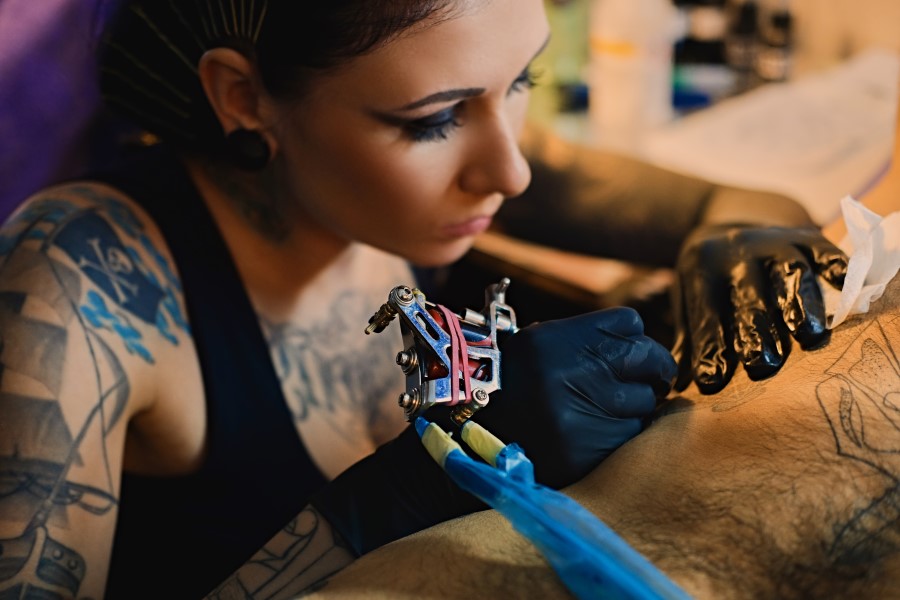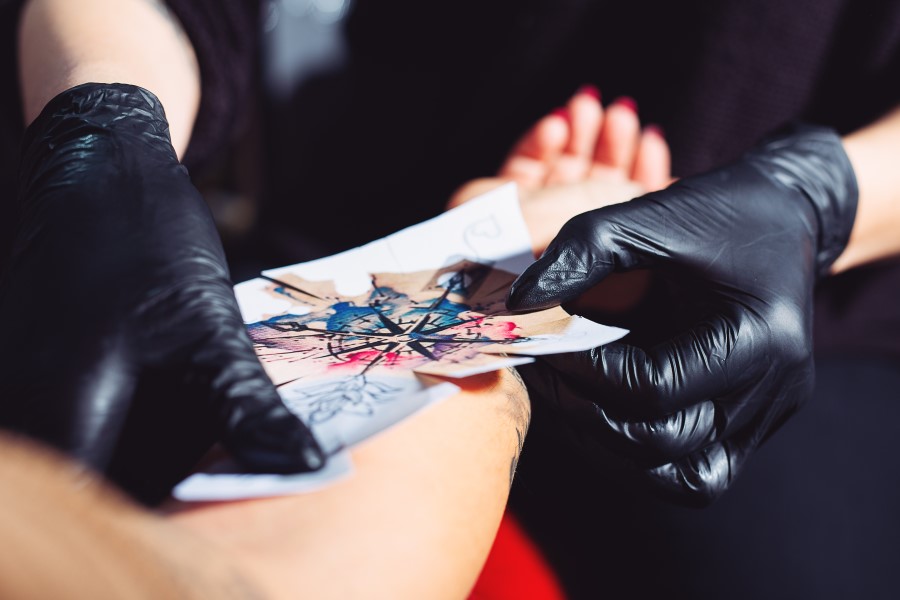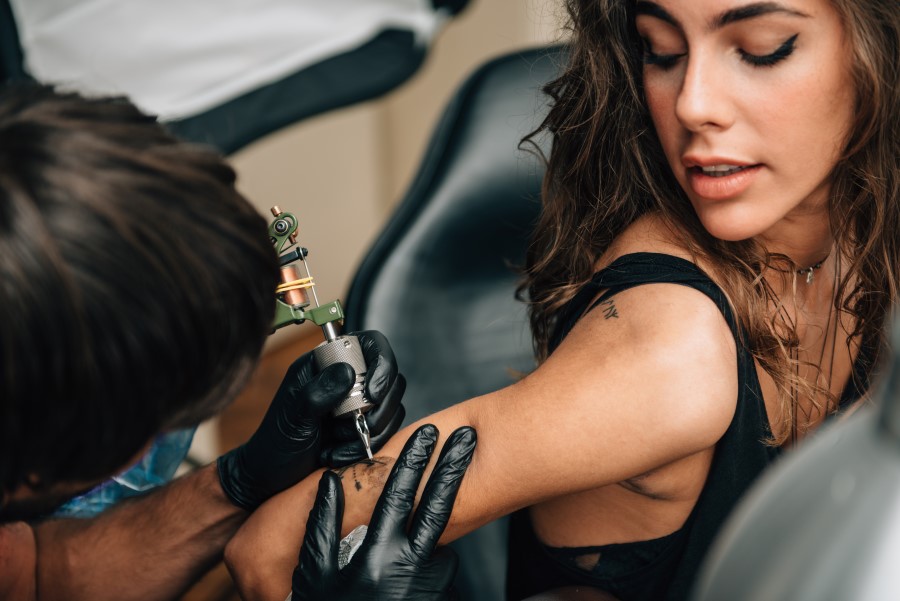A tattoo is first and foremost a serious injury to the skin. Countless needle pricks perforate several layers of skin, and then pigments are inserted as foreign bodies in places where the body cannot break them down. As with any wound, good care is important to ensure that the tattoo heals quickly and beautifully. Besides, right care can do even more. It guarantees that your tattoo is still vividly coloured and clearly visible even after many years.
Fading and smudging are normal with tattoos. However, with the right care, you can control this natural process.

Special care for tattooed skin – a good idea!
Tattoos age like your skin and with your skin. You can stop your skin aging by using various care products specially tailored to your skin‘s needs. If there are pigments under the skin, your skincare needs to be a little different, since pigments also need to be looked after. That is why tattoo care is always a good idea.
However, by tattoo care we do not simply mean looking after the injured skin just after the tattoo has been done, but also long-term care after the healing phase has been completed. This can slow down tattoo aging, i.e. the fading and blurring of the tattoo. Skin researchers have now developed numerous care products that protect tattooed skin and keep your tattoo beautiful for a long time.
Your tattoo in 3 steps
In your first consultation you will receive personalized information on your tattoo. Contact us on our email address or superchat (bottom right symbol).
Make an appointment.
Your tattoo dream will be carried out in a relaxed atmosphere.

The right tattoo care
Tattoo care changes over time. You look after your tattoo differently immediately after getting it and after it has healed. This is what ideal tattoo care involves:
1. Immediately after pricking:
- Apply a breathable plaster.
- Wash your hands first and then wash the tattoo with mild soap before applying the patch.
- Ideally, the tattoo artist will do this, but you can also do it at home.
2. Between six and eight hours after pricking:
- Ideally, the plaster simply stays on.
- If too much wound fluid has been collected underneath, change the plaster.
- Wash your hands thoroughly beforehand, rinse the tattoo with mild soap and dab with a lint-free cloth. Allow to air dry briefly before applying the new patch.
3. Between the first day and the fourth day after lancing:
- The plaster stays on for as long as possible.
- The plaster is only changed if too much wound fluid has been collected underneath.
- When changing the patch, wash the tattoo with lukewarm water and pH-neutral soap.
- After washing, dab the tattoo dry with a clean towel made of lint-free material. Do not rub under any circumstances! The patch should only be applied when the tattoo is dry.
4. From the fourth day after lancing:
- Take the plaster off completely, your skin can now manage without a plaster. Exception: rubbing clothing. You should avoid this as much as possible.
- Keep on abstaining from doing sport and swimming.
- Only wear loose clothing on the tattoo.
- Keep your tattoo clean.
- Depending on your skin, apply a thin layer of special cream at least in the morning and evening, but possibly up to six times a day. A care cream that helps the skin to heal after injuries is ideal (e.g. SKIN STORIES Rapid Repair Balms).
- Wash your hands before applying the cream so that you will not introduce any pathogens.
5. From the third week after lancing:
- Take care of your skin and your tattoo every day with a daily lotion that moisturizes and ideally has a SPF6 or more.
- Dry and rough skin requires special care, such as SKIN STORIES Defining Serum.
6. Before sunbathing:
- Whenever the sun’s rays hit your tattoo, protect it from UV radiation.
- A special cream for tattooed skin with a SPF 50+ is best suited for this. This is because intense sunlight will cause your tattoo to fade.

No-goes in tattoo care
There are a few things that your tattoo cannot tolerate. Some of them affect the healing phase, others are to be avoided permanently. Please notice:
- Until your tattoo is not completely healed (at least six weeks), long showers, baths and swimming pools are absolutely forbidden.
- Do not touch it! Until your tattoo has not healed, keep your fingers away. This applies in particular to scratching. Healing goes hand in hand with itching. Nevertheless, keep your hands off! Otherwise scars will form.
- Drink enough. You need plenty of water and a vitamin-rich diet so that your skin can heal.
- Stay out of the sun! UV radiation is very bad for pigments. You know how it is: garden furniture and summer clothes fade very quickly. Your tattoo will also fade if you forget to use sun protection!
What about normal skin care – is that also a no-go? Yes and no. A “normal” body lotion is of course always good for the skin as a moisturizer. It is also better for tattooed skin than no skin care at all. But tattooed skin needs more. Tattoo care always contains additives that protect pigments, as well as light protection filters to prevent fading. Special tattoo care is somewhat more expensive than “normal” skin care products, but it saves you the cost of re-tattooing. By the way, you do not need 20 different care products. If in doubt, tattoo care can also be used on pigment-free skin. After all, these products contain everything that is good for the skin.
The way you look after your tattoo also depends on the part of your body. For example, hands and feet are particularly vulnerable to frequent washing and friction (clothing), as well as frequent contact with light. These parts of the body should be creamed more often to prevent your tattoos from fading. On the other hand, the size of your tattoo has no influence on the frequency or type of care.
Please notice that red tones are the fastest to fade. Intensive skin care with high UV protection is recommended for red tattoos.

Special case of dry skin
Heating air, cold, extreme heat and wind, as well as rubbing clothing, lead to dry skin. This type of skin needs an extra portion of moisture. Tattoos lose their colour intensity on dry skin and appear pale. Make sure that you apply cream to dry skin areas every day. Special tattoo care for dry skin is particularly good.
Also, many people tend to develop dry skin and even neurodermatitis under stress. Do something good for yourself and your tattoo and avoid stress as much as possible.
Tattoo care in summer
UV radiation is particularly high in summer due to the high level of sunlight. However, UV radiation attacks colour pigments and therefore causes your tattoos to fade quickly. Make sure you use tattoo sunscreen to prevent premature fading and smudging.
Special cases: tattoo care for special skin types and skin diseases
There are plenty of special care products for each individual skin type, so it is fair to ask how it works for tattoos. Tattooed skin is a special skin type in itself, so the gradations within tattooed skin are no longer taken into account. Care products for tattooed skin are therefore basically suitable for every skin type.
Ideally, you should opt for a tattoo care product that is free from microplastics, mineral oils and parabens. If you suffer from very dry skin, simply use tattoo care more often. Obviously, what applies to daily care also applies to sun protection.
However, if you suffer from a skin condition, you should also listen to your doctor’s advice and use medication when looking after your tattooed skin, since only healthy skin will show off your tattoo to its best advantage. Thus, always use the medical skin care prescribed for you first. Once this has been absorbed, you can also apply the tattoo care after ten to twenty minutes (provided your doctor has no objections).

